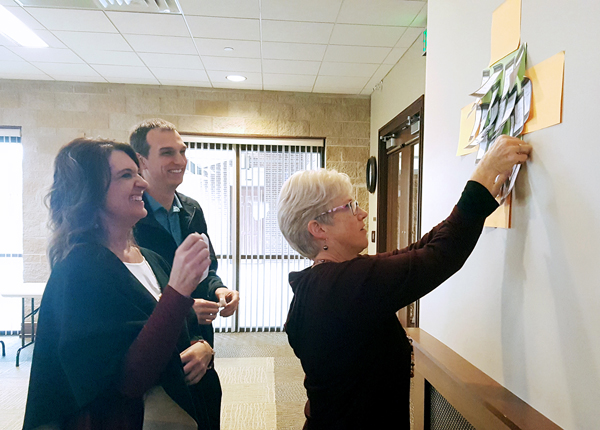By Lindsay Steele
The Catholic Messenger
IOWA CITY — Parish faith formation leaders in the Diocese of Davenport had the opportunity to learn more about preparing Generation Z for the sacrament of confirmation at a workshop Nov. 7.

Bobbi Goodin, coordinator of youth ministry for St. Andrew Parish in Blue Grass, posts a prayer intention on a paper cross during a diocesan faith formation workshop at St. Patrick Parish in Iowa City on Nov. 7. Looking on are Crystal DeNeve of Grinnell and diocesan seminarian Scott Foley.
Generation Z, or Gen Z for short, includes youths born from about 1995 to 2010. These young people are tech integrated, social innovators who are looking for a customized way to belong and contribute, said the workshop’s presenter, Tom East, director of the Washington-based Center for Ministry Development. An understanding of the characteristics of this age group can help parishes develop more effective faith formation strategies.
“There’s something different about this generation, the way they’re talking, thinking and the things they are able to do,” East said. “There are challenges, too, in how we work with them.”
During the workshop at St. Patrick Parish, East broke down some of the Gen Z stereotypes. The label of “tech addict” is misleading, for example. While they spend an average of nine hours daily on technology devices, they prefer face to face communication. Still, youths prefer to unplug on their terms — forced face-to-face time “is a hard sell.”
East said this age group has been “shaken” by the Great Recession. Despite being labeled “entitled,” they tend to be economically conservative. They are the most educated generation, but feel they have little hope of “doing better than their parents” economically. Gen Z is not particularly materialistic, craving experiences more than “stuff.”
In the faith formation classroom, youths prefer interactive and exciting learning environments, especially as attention spans continue to shorten. They seek mentors, but must have a relationship with someone prior to accepting mentorship. In relationships with adults, they seek to be treated as a peer, with a sense of mutual respect.
East said faith formation leaders should be aware that Gen Z has been affected by a culture that sees faith and science as incompatible. About 20 percent of 16- and 17-year-olds consider themselves agnostic. East shared a quote from Bishop Robert Barron, “We must continually preach, as John Paul II did, that faith and reason are complimentary and compatible paths toward the knowledge of truth.”
East said that to reach the ultimate goal — forming young people into lifelong Catholics — parental engagement is essential. Data shows that children tend to follow in their parents’ footsteps in faith and church involvement. If the parents are not engaged in the faith, it is unlikely that their child will be engaged. If parents are highly engaged, there is an 82 percent chance the children will become highly engaged, too.
Regarding the sacrament of confirmation, East acknowledged that people tend to regard it as a rite of passage, an inaccurate assumption. Confirmation prep is seen by catechists as a last chance to engage youths, and it’s seen by many youths as the official end to faith formation. Efforts should be made to empower the youth’s sense of connection to faith and the community so they will see the sacrament more as a beginning than an end.
Programs tend to focus on requirements – service hours, tests, etc. – as opposed to focusing on confirmation as a gift and an invitation. While proper preparation is essential, East said confirmation celebrates what God does, not what teens have done. Through the sacrament, God strengthens the youth’s relationship with the Holy Spirit, strengthens the teen’s ability to witness, and strengthens the candidate’s bond to the church.
East emphasized the importance of relationships with faith-filled adults in confirmation prep. The role of a catechist is to be a facilitator of grace, someone who can connect the traditions of the faith with the traditions of the community, and someone who can be a mentor. Youths “won’t remember individual lessons, they’ll remember the catechist who loved them. Youths aren’t always listening but they’re always watching,” East said, as one faith formation leader at the workshop exclaimed, “Amen!”
Luke Gregory, lifelong faith formation director for Sacred Heart Parish in Newton, said that at the workshop he “gained a lot of valuable information that can help me in working with the teens of our parish.” He found East’s explanation of generational characteristics interesting; Gregory also appreciated learning about the history of the sacrament of confirmation. The handouts provided valuable information to share with youths preparing for confirmation and their parents, he added.
Deacon Mike Comer, who serves St. Joseph Parish in DeWitt, said East’s message about confirmation as a gift is one that more faith formation leaders should take to heart. “Teaching the faith to our youth is important, but too often we view the reception of the sacrament as something that is to be earned,” he said. “Many well-meaning catechists see confirmation prep as the last opportunity to hand on the faith of the Catholic Church before our young people disappear. We create so many hurdles to the reception of the sacrament that I fear we create a self-fulfilling prophecy and chase them out of the church with bad feelings and sour memories of church. If our focus was instead to provide loving, joy-filled examples of a lived faith by authentic adult models of Catholicism we might give them reason to continue to learn.”











